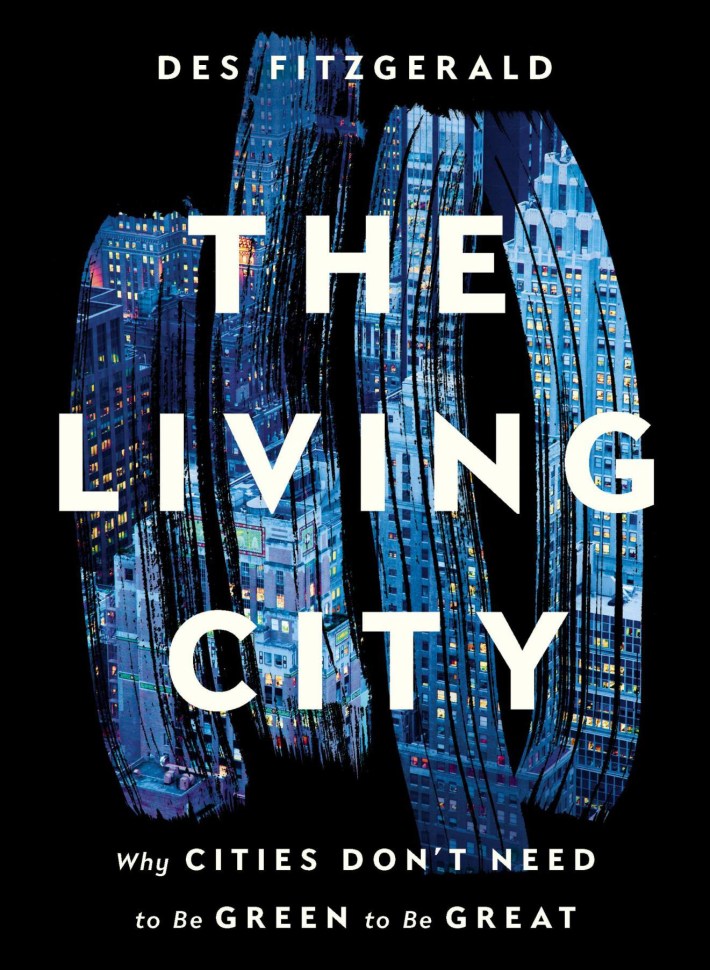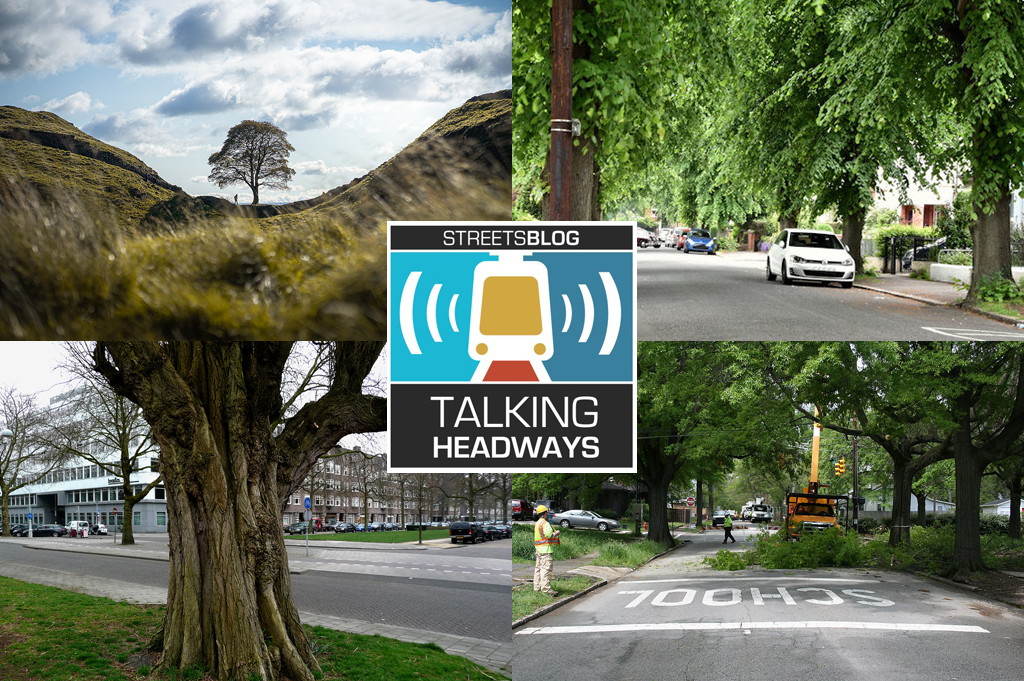This week we're chatting with professor Des Fitzgerald about his new book, The Living City: Why Cities Don't Need to Be Green to Be Great. We chat about what trees mean to people, the proliferation of moguls that want to build new cities, and the idea of what makes the good city.
We've put an excerpt below the media player, but if you want an unedited transcript (with some AI typos!), click here.
But here's an edited section to get you excited:
Jeff Wood: What did you learn about people’s feelings about nature in cities and for example, trees?
Des Fitzgerald: I’m not against trees. I do feel the need to say that. It’s in the book and it’s kind of a joke, but it’s also not a joke, right? Like, there was a big drama last week in England, which probably didn’t make it to North America, but there’s a famous tree called the Sycamore Gap tree. And so it’s this very old, very picturesque tree in a kind of a scenic hollow on Hadrian's Wall. It’s kinda a popular hiking route. And it was a tree that was also in Robin Hood, Prince of Thieves.
And last week the country woke up and someone had chopped down the tree overnight, right? And there was these kind of like traumatizing images of the stump. I’m like, people lost their minds, right? It’s very obvious that, whatever’s going on in people’s feelings about what happened, it’s not about the tree, right? This single tree is not doing anything environmentally, right? It’s not doing anything for anyone’s kind of sense of peace and relaxation. It’s clearly symbolizing something.

And it’s that kind of deep attachment that people have to, not just individual trees, but the tree as a certain kind of symbol of all that is good and right and proper in the world. That, to me, is surprising and alarming. When that tree got cut down, I had like five texts from different people kind of making the same joke. It’s like, "I think this was you." It’s interesting how transgressive it is to say I don’t like trees, right? And even the fact that it’s transgressive, I think is worth thinking with. I mean, I genuinely don’t like trees. I have allergies.
Like the idea that everyone wants to be in a forest, you know, is just baffling and I have a kind of a pet theory, which is that like what feels like my odd, you know, idiosyncratic position about trees is not odd, idiosyncratic, but kind of culturally impossible to say: I don’t like trees. You know, actually I'd to cut down the trees on my street. That is just kind of impossible to express.
Jeff Wood: Which happened in Sheffield, right? There’s some people that were like, "I want some of these trees gone."
Des Fitzgerald: Yeah. The Sheffield story is super interesting. A bunch of years ago, the Sheffield City Council hired a private company not to cut down the trees actually, but to manage the roads. So it was actually a road management program that the city council wanted to do. And in the course of managing the roads, of course, the private company that was hired to do this wanted to cut down a bunch of trees, which is not atypical in kind of road management or road widening procedures. And then that kind of snowballed and escalated to the point where the company was cutting down many thousands of trees and it became this huge public scandal. There was massive protests by local people trying to protect trees. And you know, it sounds kind of like, I dunno, maybe it sounds kind of cutesy to people, but it was not any of those things.
It was violent and unpleasant. The police were involved, big private security companies were involved. It all got super nasty, super fast and then can just resolved itself. And it’s very unsatisfying way that the council eventually, because things escalated so badly, the council basically paused the tree-cutting program. And then many years later, as is often the case, admitted that it wasn’t so great and now it’s not happening.
And now there’s a whole different partnership and things are, you know, looking a bit better. But exactly as, as you said, I mean the reason I went to Sheffield was exactly to kind of meet people. Like it was so baffling to me that you would put so much on the line to protect trees, right? That people were really putting like their livelihoods, their reputation, you know, their criminal records frankly online to protect trees in urban space.
That to me was so unimaginable to meet people who were willing to do that. And as I guess it hopefully comes across in the book that like, I am sympathetic to this or I’m like, I’m sympathetic to these people. I know it sounds like I’m kind of skeptical about this endeavor, but I don’t want it all to come across as like dismissive of people for whom this is a really serious major issue. And I think I get it. I think I get why it matters for them, but why it matters for them I think really doesn’t have all that much to do with trees as kind of biological or botanical objects. I think it has to do with trees as things that stand in for what we want a good city to be.
I don’t think what alarms people about that tree-cutting program was the trees itself. I think what alarmed them was that the practices and objects we think constitute good urban life were on the other side of this program. And so the program comes to stand in for all those kind of wider anxieties about local democracy, about participation, about people’s capacities, access to good housing actually because the trees are associate with nice housing and all those sorts of ancillary things going on in the background.
Jeff Wood: I also found it interesting that there was a discussion about the folks who didn’t want the trees taken down, but also the folks that were hiding in their houses worried about the repercussions from their neighbors who wanted the trees taken down. It was kind of like a confrontation. It feels very similar to discussions here in the United States, such as when we talk about housing and NIMBYism, right? It feels like the two sides clashing over the idea of control over space. And some people like the trees for the reasons why they like the trees. And some people don’t like the trees because they want to have control over a space that they feel is theirs. And I felt that that kind of headbutting on that really interesting.
Des Fitzgerald: I think that was one of the things that sort of took the activists by surprise; that actually what seemed to them like a completely unreasonable over-the-top approach to the trees was actually like welcomed by significant amounts of people. And exactly for the reasons you say: people who just don’t want leaves falling in their front garden that they have to clean up or don’t want particular birds pooing on their car.
That was a real thing for a lot of people. But I think we should take those seriously as clashes that are about the good city, right? I think we should take that seriously as clashes about not about trees or not about, you know, obviously it’s ridiculous to not want leaves to fall in your garden, right? You live on planet Earth. But I think we should take it seriously as two very different visions of what good urban life looks like.
And I think control is a really right way to think about it actually. People’s sense of how much control they have over the space around them is really important. And trees obviously stand in for lots of people for a certain sense of calm and timelessness and all, all those soothing qualities. But also it seems quite plausible to me that for other people, trees standing for unruliness or for lack of control. And I think one of the things I talk about in the book is the relationship between urban tree management and the scientific management of cities more generally. And the coincidence not the temporal coincidence of the idea that we can govern the city rationally with the emergence of urban tree science as a distinctive set of practices.
And that kind of sense that like you govern the trees, you govern the city. I think I do think that’s part of what’s going on in those clashes between neighbors in Sheffield, right? That kind of sense that who is going to get to say whether or not leaves fall on this patch ground. That becomes like a really important political question that is worth taking seriously.






